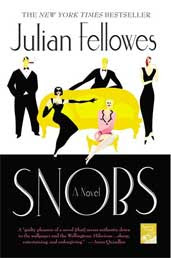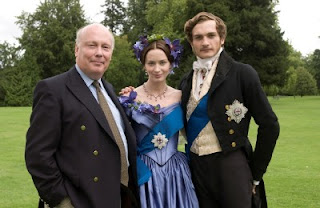Born in Egypt, where his father was in the British Embassy, Fellowes grew up in England and attended Cambridge. In a 2005 interview Fellowes said, “When I was a young man, I came from the bottom end of the landed gentry. Now I get the glad hand; in those days I made up the extra — the one who gets invited when someone else can’t make it. At house parties I had the bedroom next to Nanny with the uncomfortable bed. When you’re a minor player, you’re in a better position to see people as they really are than if you’re a grandee.”
After going to drama school, he was a “jobbing actor for ages” and appeared in more than 40 movies and TV shows, including Monarch of the Glen, in which Fellowes played the part of the titled, priviliged and somehow endearing Kilwillie. Other notable acting roles included the part of Claud Seabrook in the acclaimed 1996 BBC drama serial Our Friends in the North. He has twice notably portrayed George IV as the Prince Regent in the 1982 television version of The Scarlet Pimpernel and the 1996 adaptation of Bernard Cornwell’s novel Sharpe’s Regiment. In 1999, Fellowes played the Duke of Richmond in the Masterpiece Theatre production of The Aristocrats, based on the book by Stella Tillyard. He launched a new series on BBC One in 2004, Julian Fellowes Investigates: A Most Mysterious Murder, which he wrote and also introduced on screen.
Feeling in need of a Plan B, Fellowes turned to writing and worked for a while for BBC TV, where he adapted Little Lord Fauntleroy and the Prince and the Pauper for television. Subsequently he wrote a screenplay for Anthony Trollope’s The Eustace Diamonds, which drew the attention of producer Bob Balaban, who was looking for a British society insider to write a screenplay for a murder mystery. “And so Gosford Park was born, and so was the rest of my life,” explained Fellowes, who won the Oscar for Best Writing, Screenplay Written Directly for the Screen in 2002 for that film.
In addition to Gosford Park, Fellowes wrote the screenplay for Mira Nair’s Vanity Fair (Starring Reese Witherspoon) and the book for the London and Broadway productions of Mary Poppins. He also wrote and directed Separate Lies, which he described in 2005 as “a French film in English, about middle-class people being unhappily married, which will doubtless be steamrollered in the Big, Bad World, but I love it and I loved making it, so I have no sad tales to tell.”
 The year 2005 also saw his novel Snobs published, which focused on the social nuances of the upper class and concerned the marriage of an upper-middle class girl to a peer and became a Sunday Times Best Seller. In a 2005 interviews, Fellowes said, “At the risk of vanity, I would say the accuracy of the book was what irritated them most. Like politicians or show-folk, toffs usually shrug off any criticism of themselves in fiction by pointing out the inaccuracies which demonstrate that the author cannot have had a close view. One senior aristocrat was reported as having said, “The problem with Snobs is you can’t fault it.” An old pal telephoned with the greeting, “It’s a wonder to me you have any friends left!” However, all in all, I would say more of them were amused to find their world in print than were offended. For which I am heartily grateful.” 2008 saw the publication of his second novel, Past Imperfect, which also became a Sunday Times Best Seller.
The year 2005 also saw his novel Snobs published, which focused on the social nuances of the upper class and concerned the marriage of an upper-middle class girl to a peer and became a Sunday Times Best Seller. In a 2005 interviews, Fellowes said, “At the risk of vanity, I would say the accuracy of the book was what irritated them most. Like politicians or show-folk, toffs usually shrug off any criticism of themselves in fiction by pointing out the inaccuracies which demonstrate that the author cannot have had a close view. One senior aristocrat was reported as having said, “The problem with Snobs is you can’t fault it.” An old pal telephoned with the greeting, “It’s a wonder to me you have any friends left!” However, all in all, I would say more of them were amused to find their world in print than were offended. For which I am heartily grateful.” 2008 saw the publication of his second novel, Past Imperfect, which also became a Sunday Times Best Seller.In the 1970s he also wrote romantic novels, using the names Rebecca Greville and Alexander Morant.
In 2006 and 2007, Fellowes was the host of the BBC TV panel game show “Never Mind the Full Stops.” He wrote the screenplay for The Young Victoria, and has other screenplays to his credit, including Jonathan Strange and Mr. Norrell.



Great post and what a brilliant man.I'll have to check out Snobs.
Carol L
Lucky4750@aol.com
I believe Mr. Fellowes is pulling a "Somerset Maugham." In "The Razor's Edge" the author, Somerset Maugham…"inserts himself as a minor character, a writer who drifts in and out of the lives of the major players." He also narrates a good part of the action.
Since the narrator of "Snobs" is an actor who drifts in and out of the lives of the major players, I think it is pretty obvious that Mr. Fellowes has inserted himself into the story as a sly reference to Maugham, who also wrote about the difficulities of negociating the divide between the social classes.